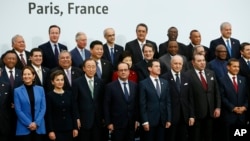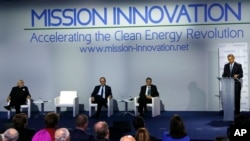At the U.N. talks in Paris nearly 200 nations agreed to curb carbon dioxide and other greenhouse gas emissions, limiting temperature rise to well below 2 degrees Celsius above pre-industrial levels.
While the mood was jubilant, the question remains whether nations can meet this goal and avoid the most catastrophic impacts of climate change, especially among island nations and in the developing world.
Niklas Hohne is co-founder of the New Climate Institute in Cologne, Germany and a lead author of the Intergovernmental Panel on Climate Change, a United Nations scientific assessment that confirms that the world is warming and human activities are responsible.
“No coral reefs would survive a 2 degree rise in temperature. Limiting the increase to 1.5 degrees – a target the deal is committed to “pursue” - would save about 30 percent,” he said.
The 1.5 degree target would also reduce the risk of a meltdown of the Greenland ice sheet and global sea level rise. “But emissions have to be reduced very quickly to zero,” Hohne said. “And the earlier we do it, the lower the temperature increase.”
However, the emissions cuts detailed by each country in Paris don't add up. At best they lead roughly only half-way to the 2-degree goal.
Bob Deans, director of strategic engagement at the Natural Resources Defense Council (NRDC), said what is promising is that all nations have agreed to make stronger commitments over time.
“The treaty requires all the nations to take an inventory of emissions. We’ve never had that before," he said. "When you know where the carbon pollution is coming from, you are in a better position to take care of it.”
The emissions will be monitored, and the information shared with the world. While the agreement is voluntary, countries will return every five years to take stock.
Carbon fuels
Coal, gas and oil account for 80 percent of the world's energy use.
Jeff Holmstead is an environment analyst with Bracewell and Giuliani, a law firm in Washington. While he sees the accord as heading in the right direction, he said renewable energy is not now a realistic substitute for fossil fuels in most of the world.
“There is an imperative to bring people out of poverty, to give those people many of the same advantages that we enjoy in our country today, and figuring out how to do that without increasing greenhouse gas emissions is a very challenging thing to do,” he said.
Holmstead said an international price on carbon could help level the playing field and make adoption of renewables more competitive in the market place.
So will support for cleaner energy options from financial institutions, cities and private corporations, said the NRDC's Bob Deans. "We’re going to have something like $50 trillion invested in energy systems over the next two decades. A lot of that is going to be for wind and solar clean power, for distribution systems to make it available to people, for storage systems so that people can use it most effectively when they need it.”
The United States, France and 18 other countries announced they would double research and development funds over the next few years to foster clean energy options. Twenty-eight other private investors, including Microsoft co-founder Bill Gates, made a similar promise.
Countries will meet in April to sign the accord.







